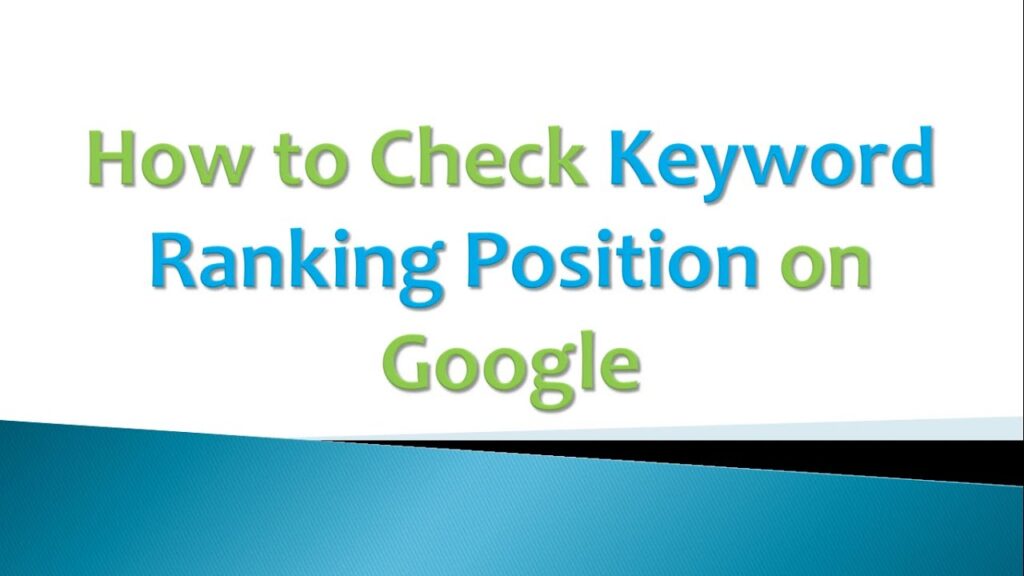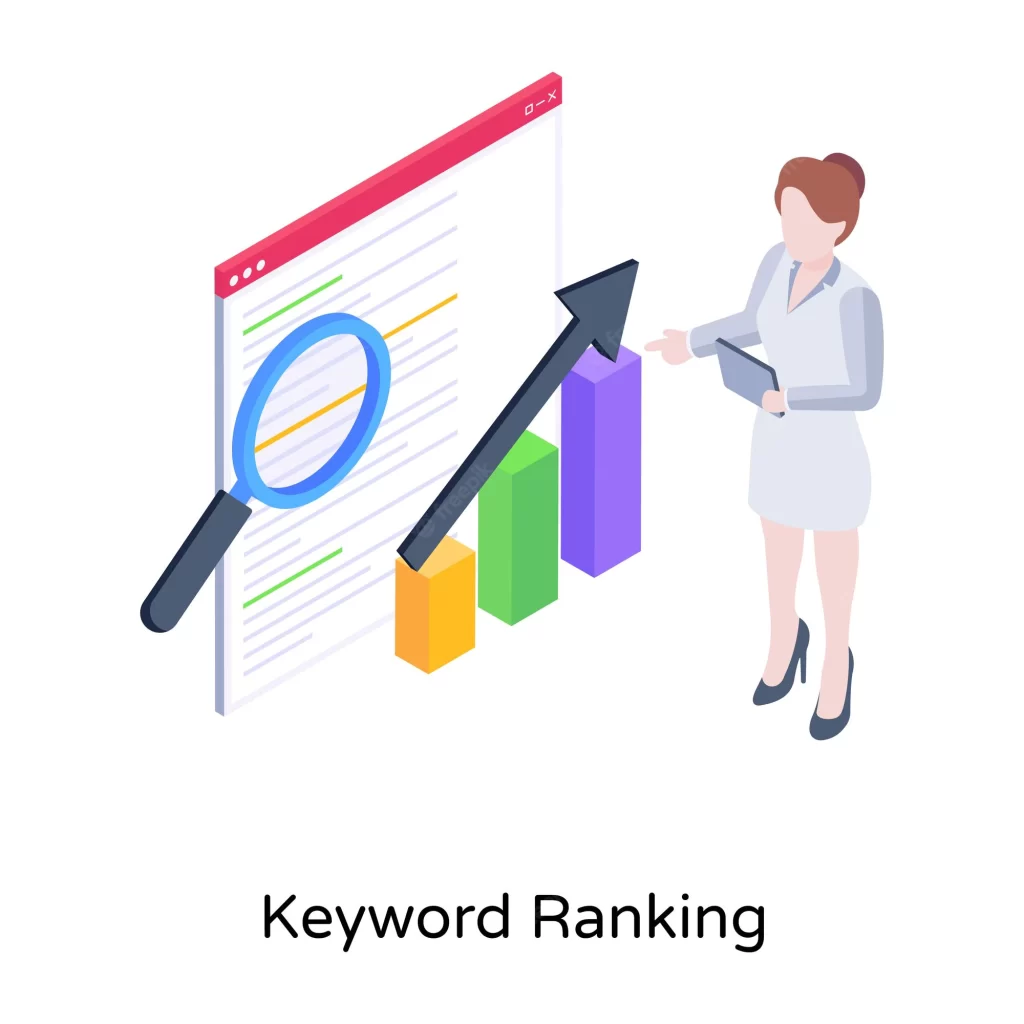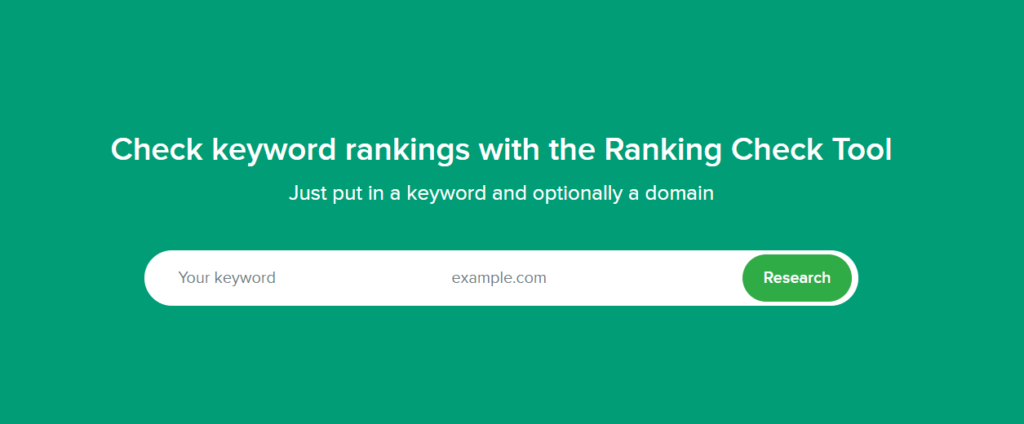
Intro:- How to Check Website Ranking Position on Google? To generate an “organic” search result, Google matches every word or phrase you type in the search box (your key term or search phrase) to its index of web pages to find matches. Google displays these matches as search results which are simply lists of web pages in order of relevance. So, the first organic result is the web page Google believes to be the most relevant to your search, and so on.
If a web page appears first in a list of results it is said to rank first or to be in position one for that specific key term. Similarly, if it appears 19th in this ordered list of search results it is said to have a ranking position of 19. Ranking positions are reserved for “organic” search results and it doesn’t normally include non-traditional organic results (such as maps) or paid advertising (Google Ads).

About:- We will learn in this article, how to check keyword ranking positions on Google. It is very important to know if you are a blogger. Let’s describe how.
Google’s Search Console is a free tool that website owners can sign up for. Find out how to check your website ranking on google with this tool at the bottom of this article. It shows all the terms that the website and how the webpages ranked for these search terms over time. There is lots of other information about these visitors as well including their country and device. There are also a number of good commercial banking services (e.g. the SE Ranking keyword tracker) that you can pay for that track ranking positions, monitor competitors and can provide user-friendly reports and alerts.
“SERP” is an abbreviation for “Search Engine Results Page”, i.e. the search query result page for a query on Google. The first 10 organic results will appear on page 1, the next 10 results on page 2, and so on.
How to Check Website Ranking Position on Google? If you are reading this article that means you want to know how to check your website ranking position on Google, right? But, you don’t have any idea how or where to start. If you are looking for an easy guide on how to check a website ranking position on Google then you are in the right place. Just you have to read this article properly. In this article, I will show you a step-by-step tutorial on how to check a website’s ranking position on Google. Even if you are a beginner there is no worry about it. The steps below are for both beginners & experts.
But before beginning to start a blog, there are some major points that you should know, like(FAQs)
- What is a website’s ” Ranking Position ” on Google?
- What does keyword position mean?
- What is keyword position in research?
- What is keyword position tracking?
- What types of Google Search Results are there?
- What is an “Organic” Search Result on Google?
- Are Google ranking positions different depending on who is searching?
- How to check website ranking on Google?
- What is a “SERP”?
Let's Find It Out;
1. What is a website's "Ranking Position" on Google?
To generate an “organic” search result, Google matches every word or phrase you type in the search box(your key term or search phrase) to its index of web pages to find matches. Google displays these matches as search results which are simply lists of web pages in order of relevance. So, the first organic result is the web page Google believes to be the most relevant to your search, and so on. If a web page appears first in a list of results it is said to rank first or to be in position one for that specific key term. Similarly, if it appears 19th in this ordered list of search results it is said to have ranking position 19. Ranking positions are reserved for “organic” search results and it doesn’t normally include non-traditional organic results(Such as maps) or paid advertising (Google Ads)
2. What does keyword position mean?
what is a keyword position? In a clear, straight-to-point definition, a keyword position is the rank or rung a website holds in the search engines, in relation to other competing websites, for a given keyword.
3. What is keyword position in research?
Keyword position is your ranking in Google for a specific word or phrase. In other words, it’s where you are located in search results for a term or search phrase. Knowing your keyword position is really because it gives you a quick overview of how you’re doing.
4. What is keyword position tracking?
Keyword rank tracking (also sometimes referred to as “position tracking” or “SERP tracking”) is the practice of regularly monitoring how a website ranks for a specific set of search terms.
5. What types of Google Search Results are there?
These days Google delivers lots of different types of results for a search whether it is on a mobile device or a desktop PC. For example, if you search for “Cake shop Liverpool” on a mobile you see three adverts, then a map-based list list of local businesses, then some image results, and then finally you get to the organic search results. The type of search result you see will vary depending on the term you use and the device. To see more results, you need to page two on a desktop or select “more results” on a mobile. For large searches, there can be thousands of these pages listing millions of websites.
6. What is an "Organic" Search Result on Google?
An organic search result is based on Google’s best guess of the best webpage that answers your search term. This is in contrast to other search results like adverts which appear based on how much a company is willing to pay for you to see their advert. For this reason, they are not always very relevant to your search. Google’s other search result types mingle with these organic results to provide relevant results to you. In some cases this is by prioritizing different types of content (like images or videos rather than page text) or by showing results for slightly different search terms. How exactly these results are generated is not clear and it is not always simple to tell the extent to which they have been paid for or manipulated in other ways. As a result, organic search results remain the gold standard as they are purely about matching relevant content to a key term search.
7. Are Google ranking positions different depending on who is searching?
Yes, Google doesn’t provide the same search results for a query to all users. Factors such as the user’s location, the page’s relevance to their location, and their past searching habits may affect what they see.
8. How to check website ranking on Google?
Google’s Search Console is a free tool that website owners can sign up for. Find out how to check your website ranking on google with this tool at the bottom of this article. It shows all the terms that website visitors used in an organic search to find the website and how the web pages ranked for these search terms over time. There is lots of other information about these visitors as well including their country and device. There are also a number of good commercial banking services (e.g. the SE Ranking keyword tracker) that you can pay for that track ranking positions, monitor competitors and can provide user-friendly reports and alerts. Website Ranking Position on Google
9. What is a "SERP"?
“SERP” is an abbreviation for “Search Engine Results Page”, i.e. the search query result page for a query on Google. The first 10 organic results will appear on page 1, the next 10 results on page 2, and so on.
Let's Check the Google Ranking Position of the Website
There are so many paid tools to check the website’s ranking position. But Today I will show you one of the easiest ways to check your website ranking position and that is also with a live checker;
Just you have to enter your keyword and website.com name and click on the “Research” Button and you will see your result within 30sec.

Authored By The Er. Pramod Adhikari!
The Blogger, Author & CEO’s The Infinity Company! B. Tech in CSE(Computer Science & Engineering) from Sambhram College, Bengaluru-560097, Working worldwide as Software(Web/App) Developer!


